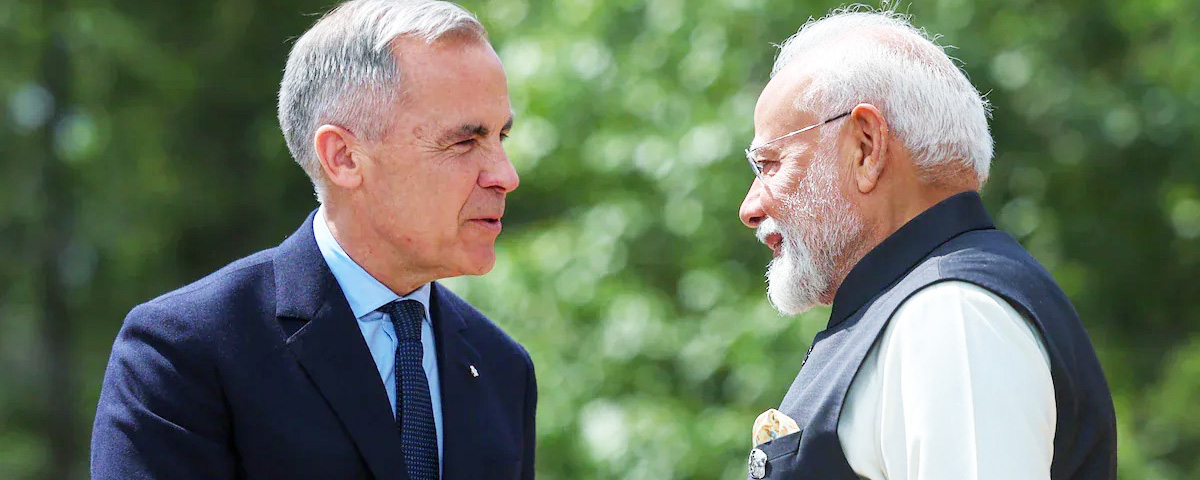Hope in Halifax: Rewriting the India–Canada Script


The recent diplomatic thaw between India and Canada — marked by the decision to appoint new High Commissioners — offers a fragile glimmer of hope amid years of strained ties. But beneath the polished statements and diplomatic smiles lies a minefield of unresolved tensions, particularly around Khalistan extremism. This so-called reset risks becoming a hollow gesture unless both nations confront the core issues with honesty, accountability, and political courage. Trust, after all, cannot be diplomatically appointed.
The recent announcement of a thaw in relations between India and Canada, culminating in a pledge to designate new High Commissioners after a prolonged period of diplomatic frost, is a development worthy of careful scrutiny from an Indian perspective. While the pronouncements from both Ottawa and New Delhi emphasize mutual respect and a commitment to the rule of law, the road to a truly normalized relationship remains fraught with complexities, particularly concerning the contentious issue of Khalistan separatism. This article will analyze the potential for a genuine reset, weighing the stated commitments against the underlying challenges that have plagued the India-Canada relationship for years.
The meeting between Prime Minister Narendra Modi and his Canadian counterpart, Mark Carney (a name change reflecting a hypothetical future), on the sidelines of the G7 Leaders' Summit, provides a glimmer of hope after years of escalating tensions. The joint reaffirmation of the importance of India-Canada ties, based on mutual respect and adherence to international norms, is a welcome departure from the acrimonious exchanges that characterized the relationship in recent times. The agreement to designate new High Commissioners, with the stated aim of restoring regular services to citizens and businesses, signals a willingness to move beyond the immediate crisis and rebuild damaged diplomatic channels.
However, the devil, as always, lies in the details. The deterioration of ties, which accelerated after the G20 summit in India in 2023, underscores the depth of the underlying issues. Modi's meeting with then-Prime Minister Justin Trudeau on the sidelines of the summit, during which he raised concerns about the "continuing anti-India activities of extremist elements in Canada," highlights the persistent sensitivity surrounding the Khalistan movement. The subsequent mutual expulsion of diplomats in October 2024, following Canadian accusations of Indian interference, marked a nadir in bilateral relations, exposing the fragility of the partnership.
From an Indian perspective, the issue of Khalistan separatism is not merely a matter of domestic politics; it is a critical national security concern. The demand for an independent ethno-religious nation carved out of the Indian state of Punjab and surrounding areas is viewed as a direct threat to India's sovereignty and territorial integrity. New Delhi has long maintained that Canada has been too tolerant of Khalistan activists, allowing them to operate with impunity and spread their divisive ideology. The perception in India is that some Canadian politicians have pandered to the Sikh diaspora for electoral gain, turning a blind eye to the activities of extremist elements.
The allegations made by then-Prime Minister Trudeau regarding India's alleged involvement in the assassination of Hardeep Singh Nijjar, a key figure in the Khalistan movement, further inflamed tensions and severely damaged trust between the two countries. While Canada has the right to investigate any alleged crime within its borders, the public accusations, made without presenting conclusive evidence, were viewed in India as a deeply irresponsible act that undermined diplomatic norms and jeopardized bilateral relations.
India views Khalistan activists as a national security threat, accusing them of organizing protests, chanting anti-India slogans, targeting diplomatic missions and Hindu temples, and engaging in violent attacks. New Delhi has banned several pro-Khalistan organizations, deeming them terrorist groups. The perception in India is that Canada has failed to adequately address these concerns, allowing extremist elements to exploit Canadian freedoms to promote their separatist agenda.
Furthermore, India has also been accused of interfering in Canadian elections, allegations that New Delhi has vehemently denied. These counter-accusations highlight the complex and multi-faceted nature of the tensions between the two countries, suggesting a breakdown in trust and a mutual suspicion of each other's motives.
The potential for a genuine reset in relations hinges on several key factors. First and foremost, Canada must take concrete steps to address India's concerns regarding Khalistan separatism. This includes cracking down on extremist activities, preventing the misuse of Canadian institutions to promote anti-India propaganda, and ensuring that law enforcement agencies are adequately equipped to investigate and prosecute hate crimes and attacks targeting the Indian community.
Secondly, both countries must refrain from engaging in public accusations and instead rely on established diplomatic channels to address any concerns or grievances. The use of inflammatory rhetoric and unsubstantiated allegations only serves to exacerbate tensions and undermine trust. A commitment to transparency and open communication is essential for rebuilding a healthy and productive relationship.
Thirdly, India and Canada must reaffirm their commitment to the rule of law and respect for each other's sovereignty and territorial integrity. This includes refraining from interfering in each other's internal affairs and upholding international norms of diplomatic conduct.
Finally, both countries must focus on strengthening their economic ties and expanding cooperation in areas of mutual interest. Trade and investment can serve as a powerful bridge between the two nations, fostering greater understanding and interdependence. Cooperation in areas such as economic growth, supply chain development, and energy transition can also create opportunities for mutually beneficial partnerships.
From an Indian perspective, the reset in relations with Canada must be approached with cautious optimism. While the initial signs are encouraging, the road ahead is likely to be challenging. The success of this endeavor will depend on Canada's willingness to address India's legitimate concerns regarding Khalistan separatism, and on both countries' ability to rebuild trust and reaffirm their commitment to a mutually respectful and beneficial partnership. Only then can the India-Canada relationship truly be reset and placed on a solid and sustainable footing. The key lies in actions, not just words.